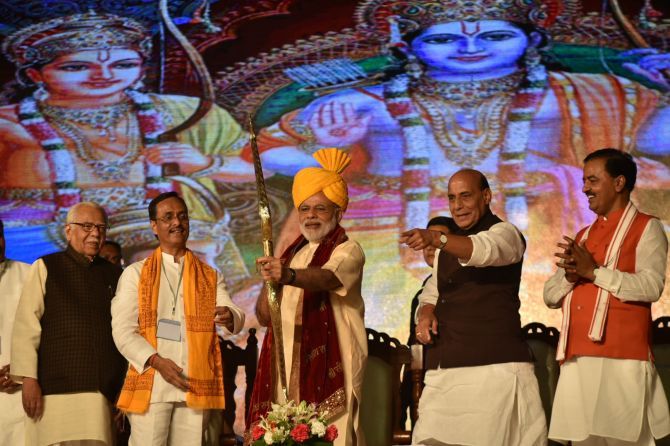'The timing is a little suspect.'
'Could it be, just be, a convenient tool to wield months ahead of a hyper-crucial state election, judge if its efficacy in sending out its subliminal message is intact, and accordingly decide the future course of action on the long but quick road to 2019,' asks Saisuresh Sivaswamy.
 No one, repeat no one, in their right minds can oppose the concept of the Uniform Civil Code.
No one, repeat no one, in their right minds can oppose the concept of the Uniform Civil Code.
Ergo, can it be possible that ours is a country where those in their right minds are in a woeful minority, given that the issue of the UCC is as old as the Constitution itself, which through its Directive Principles vide Article 44 prescribes the enactment of the UCC but which every government has been singularly unmindful of.
For the uninitiated -- or, to give them their proper descriptor, the millennials -- it may seem from the above that India so far has only been ruled by those who had little regard for Constitutional proprieties, for how else can it be explained why a government would brush under the carpet what can only be a logical measure in a country that boasts of equality before law as one of its cardinal principles.
Yet, the converse is true. Each and every government since Independence has been zealous about defending Constitutional values, barring some minor aberration along the way.
Can anyone accuse the first prime minister of the country of not having regard for the Constitution?
Or the diminutive in size but larger than life man who succeeded him?
Or any of those whose fortune it has been to preside over the fortunes of this vast land?
So what explains their unwillingness, reluctance, even refusal, to visit the subject of the UCC?
What is so untouchable about a legal reform which is the norm in the developed world that we so yearn to belong to otherwise, but about which we, at best of times, are conflicted about?
That the very utterance of the abbreviation strikes terror among the minority communities, or at least among those who have made a career and living as the purveyors of their destiny, is obvious. It is so obvious that I feel ashamed to even mention it.
The shrill campaign against the very first baby steps taken by this government towards the enactment of a UCC, which can only escalate to a crescendo as the days go by and the government digs its heels in, is clear indication that the fight will be as bitter as it is protracted, and will be fought in every possible battlefield, from television studios to the streets, from Parliament to places of worship.
Tempers are going to be very, very ruffled.
Those ranged against the UCC have history on their side, and who can forget that history of 30 years ago, the bitterest part of contemporary Indian history.
It was when the forces of progress and modernity yielded to the storm-troopers of democracy, the incensed mob on the street.
Then, as now, it was the UCC.
Then, as now, it was the mere mention of these words that had wrought irrepairable damage to the body politic, though in the present instance we are yet to come to that.
But blood will be drawn, make no mistake about it.
Prime Minister Rajiv Gandhi, he of the humongous Parliamentary majority that was denied to even his far illustrious grandfather, quickly realised that all the numbers didn't amount to much when the Muslim community rallied against a Supreme Court verdict that granted alimony to an old, divorced Muslim woman.
Perhaps the verdict would have gone unnoticed had the Supreme Court judges not gone wide of the field to remark on the need to have a Uniform Civil Code.
This was the red flag that self-styled Muslim leaders used to whip up a storm before which Mr Gandhi realised his brute majority came to its knees.
What he did next was outrageous: He used his majority to bring in a Constitutional amendment negating the Supreme Court verdict in the Shah Bano case.
But what he did after this was egregious. To satisfy the Hindu sentiment that had been offended by this open pandering to minority demands, he unlocked the doors to a disputed shrine in Ayodhya which both Hindus and Muslims claimed as their own. That rings a bell, I hope?
So you see, it was the mere mention of the need to have a UCC by the Supreme Court reiterating the Directive Principles that led to calamitous events which ultimately led the nascent Bharatiya Janata Party to move from political ICU to, ultimately in 2014, the most coveted address in all of India. 7 Racecourse Road/Jan Kalyan Marg.
Proving thereby that in the right hands, with the right kind of mix, the Uniform Civil Code has revivifying effects, something on the lines of the Sanjeevani Booti, to use lingo in tune with the times.
Actually, if one goes back in time, the BJP's armoury had two weapons: The Ram Janambhoomi was the apparent one, while the UCC worked at a subliminal level, to show the people how 'they' had the clout to overturn a court verdict in 'our' land.
The problem with the first weapon was, unlike divinity whose birth it commemorates, it had a use-by date.
Grass-root politicians knew it, not vandals easily roused to demolition. Which was why, the finest of them India has produced since M K Gandhi, decided to do nothing on December 6, 1992.
P V Narasimha Rao knew what also came down that day was the BJP's Parliamentary pass for perpetuity.
Perhaps L K Advani too realised it, which was why he broke down that day.
But the subliminal weapon has lost none of its potency even now, and unlike the Ram Janambhoomi issue it cannot be blunted even by judicial intervention; if anything, it can only be strengthened by the courts.
So, 30 years hence, here we are, at an all too familiar place. The Uniform Civil Code is once again in the balance, with a crucial difference however. Unlike the previous governments that baulked at touching the hot potato for fear of it affecting their minority votebank, what we have now in New Delhi is a government that does not depend on the minority vote.
Any accretion in its votes is always welcome, but this is not a government that will bend over backwards, or bend a Supreme Court verdict for that matter, to please the minorities. Which explains its break with the past on first the triple talaq, and now the UCC.
But it is moving cleverly, not clumsily, through the thicket of public opinion, by approaching these subjects not from the executive/legislative route but through the judiciary, thus ensuring that it remains on the right side of progressive thought.
The timing, however, is a little suspect. Could it be, just be, a convenient tool to wield months ahead of a hyper-crucial state election, judge if its efficacy in sending out its subliminal message is intact, and accordingly decide the future course of action on the long but quick road to 2019?
IMAGE: Prime Minister Narendra Modi at the Aishbagh Ramleela in Lucknow, October 11, 2016.










 © 2025
© 2025